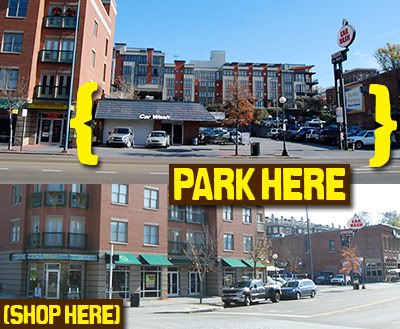
Friday, November 28, 2008
Parking!

Tuesday, November 25, 2008
Mero Jiwan Nepal Ma
She's got a blog. Go to it, and read it, and try not to get too jealous that YOU'RE not volunteering in rural Nepal until July 2009.
http://ewray123.blogspot.com/
Here's a picture. Guess which person is named "Elizabeth."

And here she is with her host family:

We almost feel like we know a celebrity. Or, it's kind of like the feeling you get when you're into this really obscure band, and all of a sudden the band breaks into huge popularity, and then you can say, "I listened to them BEFORE they were cool," as if it somehow makes you cooler by association. We can say, "That's right, E-Wray worked part time with us over the summer as she was raising support to go to Nepal. In your face."
Not that E-Wray is the kind of person who would wish to be made much of. But we want to direct you, loyal blog readers, to her, so that she can direct you to the issues she's confronting in rural Nepal, which are a much bigger deal than any individual person, she or I or you or anyone.
As we wrote in our last email newsletter, E-Wray will be teaching English, health, life skills, hygiene, environmental sustainability, and more.
Monday, November 24, 2008
24:Redemption (yes, I watched TV)

Saturday, November 15, 2008
Don't Forget the Little Guy
Here is an excerpt:
"On Thursday, after a week of bad news from retailers such as Best Buy Co. and Starbucks Corp., Wal-Mart said earnings for the third quarter rose 9.8% while sales rose 7.5%. At stores open at least a year, sales rose 3%, twice as much as a year before, and far better than nearly every other U.S. retailer.
Behind the figures is a confluence of trends fueled by the downturn. As strapped consumers look for cheaper goods, and weaker retailers go out of business, Wal-Mart is using its unmatched economies of scale to drive down prices, undercut competitors and squeeze costs out of suppliers ever more dependent on the Bentonville, Ark., behemoth.
Indeed, the downturn is increasing Wal-Marts clout just as its dominance was being threatened by diminishing returns on its big-box expansion formula, more-selective consumers and a growing field of rivals. The company's size is now turning to its advantage: for every $1 spent in the last year on goods other than cars in the U.S., 8.2 cents went to a cashier at a Wal-Mart store or a Sam's Club, the company's membership warehouse chain, according to Michael Niemira, chief economist at the International Council of Shopping Centers."
This is not a post to complain about Wal-Mart, but rather one to encourage you reading this to try your best to continue supporting local businesses as we all try to navigate the uncertain economic future.
As consumers we have a tremendous amount of choice when deciding where to shop. How we make that decision as a society has a big impact on how our lives and cities look. I hope we all decide to enrich our lives and cities by directing our spending to local enterprise at a level sufficient to sustain local businesses through the current economic slump. Although there is a moderate 'premium' to buying local, I'm certain that, in the long run, the cost to our community of sustaining and maintaining a given local business is much, much lower than allowing it to fail and eventually start over.




